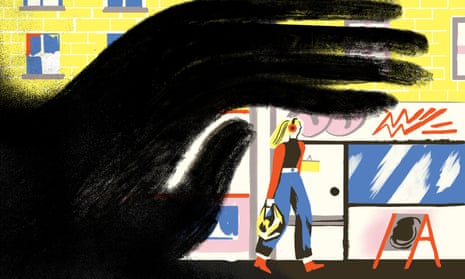The first time it happened, I refused to believe it for a very long time.
He had grabbed me from behind, around my neck. I never saw his face. Just smelt the rum and Coke, wet across my cheek, a scent that still makes my insides clench and my throat close in terror.
I tried to fight. I was overpowered. Pulled into a dark grassed space and violated while my eyes fixated on a church steeple in the distance, left wondering how this could be allowed to happen.
He lifted his body from mine, swore and kicked me. I had stopped moving. Stopped screaming into the hand closed around my mouth so hard I would be staring at the purple shadows of his fingertips on my cheeks more than a week later. Breath came in broken staccato shakes.
I lay there for seasons, before picking myself up, trying to repair the fastener of my pants and remember why I had been there.
Toilet paper. I’d been walking to the 24-hour shop to buy toilet paper. Just a 10-minute walk from my flat, in a neighbourhood so safe children walked to shops alone.
The self-flagellation started immediately. I was a policeman’s daughter. I knew better than to be walking around the streets late at night.
I berated myself all the way home, and then back out into the night again, because I had been wearing my flatmate’s shoes and I suddenly became obsessed with finding the one I had left behind.
Maybe, I thought, if I could fix this one thing, put the shoes back where I found them, it would be as though the night had never happened.
I came across it, discarded on the grass, marking where I’d become a different person. I carried it home, still bleeding, then sat in the shower until the hot water ran cold and the cold ran numb.
I was too ashamed to report it. I’m still ashamed I didn’t. I hadn’t seen his face. I was barely out of school. I’d only just set out on my own and I had failed. I’d been walking alone at night. What did I think would happen?
A hesitant attempt to talk about it with friends confirmed it. “Why were you walking so late?” It’s a well-meaning refrain. And I know now that it comes from a place of needing to feel safe: “What did you do wrong, so this won’t happen to me?”
But asked while I was still so raw it hurt to sit, it only planted a seed of rage. It wasn’t my fault and yet my actions were under review. I shoved it as far back in my mind as I could, buried it under bad decisions and denial, until the avalanche swamped me and, sinking, I chose help.
When it happened a second time, more than a decade later, the question slipped back under my skin.
This time, I had done everything “right”. I was walking down one of the most populated streets in the city. It was well-lit. What the CCTV cameras didn’t cover, the staffed shopfronts did.
But he saw me as he left a club, and he followed me as I strode, with purpose, phone in hand and keys at the ready, the last few steps to my home.
I crossed the street. He crossed with me. I crossed back. There he was. I went to run, but the traffic was against me, and he grabbed me, in full view of the intersection, yelling that he loved my hair, my face, and why wouldn’t I just let him kiss me?
I didn’t recognise the creature who made the guttural sound that emerged from my mouth. Who clawed, and fought, and jammed fingers into soft, vulnerable spaces. Who still hesitated to cause permanent damage, because even while lying on my back, fighting for my life, maiming another human seemed wrong.
It felt as though my cheekbone exploded under the first slap. The second, third, fourth made my face feel like soup.
But worse was when another man stopped at traffic lights made eye contact with me, as my attacker began dragging me, my knees scraping along the gravel towards darkness, then looked away.
A couple driving past had also looked away, they later told me, thinking it was a domestic, until one of them asked: What if it was our daughter?
They drove on to the footpath as I strained with every fibre of my being to stay in the light. My attacker ran and I went straight to the police.
I gave a statement worthy of a detective’s daughter and there was DNA under my fingernails. He was found within half an hour.
He was charged with attempted rape but, before we went to court, it was downgraded to assault under a plea arrangement and we never went to trial.
And when I talked about it, again, the questions came. Why were you out walking so late? How were you walking? What were you wearing? Did you smile at him?
And again they meant: “What did you do wrong, so we can avoid the same mistake?” What action did you take, so this won’t happen to me? How do I help my loved one stay safe? How can I stay safe?
I wrote as much in my victim impact statement to the court, asking the judge why must the conversation immediately turn to my actions, instead of the most obvious one – why are men attacking women in the street? In their homes? In parks, and on public transport, and in taxis and on doctor’s examining tables?
A friend told me it’s because he thought they were not men. That they were animals. “How do you even begin to reason with an animal like that?”
But he’s wrong. They are men.
They are sons and brothers, and fathers and boyfriends and husbands and friends and co-workers and the guys around you in the cafe.
We know they are, because the few who face the justice system get character references about how they are good guys, who are good sons and brothers and fathers and boyfriends and husbands and friends and co-workers who made a mistake.
How that action isn’t the person they are. How they were drunk. And how it wasn’t rape, the girl was complicit.
They’re not monsters but it’s so much easier to paint the few who are charged as such. Because we know how to look out for the bogeyman. We’ve been training for it our whole lives. We’ve been checking under our beds when, so many times, they are in them.
They’re not monsters. They’re human. And thinking of them as anything but only adds more distance between what was done and who did it.
A man raped me. Another man attempted to. And it had nothing to do with how I walked, or when I walked, or what I wore as I walked, and everything to do with the actions they took.
It has nothing to do with living in a fantasy land, where the word “no” acts as a shield, and everything to do with how we teach those little boys who become men about those little girls who become women.
I know I’m lucky. I’m not dead. There have been no vigils in my name, no candles lit in my memory. Because whatever quirk of fate led a rapist on to my path, it didn’t also make him a killer.
And yet every time I hear the questions about the length of skirts, the layers of makeup or the routes that are taken, I rage. For the women. For the girl I was. For the people who ask those questions because they just want to know how to stay safe. I mourn for them all.
Amy Remeikis is a Guardian Australia political reporter
- In Australia, the national rape and domestic violence hotline is 1800 RESPECT (737 732) and the crisis support service Lifeline is on 13 11 14. In the UK, Samaritans can be contacted on 116 123. In the US, the suicide prevention lifeline is 1-800-273-8255. Other international helplines can be found at www.befrienders.org
- The comments on this article are being pre-moderated

